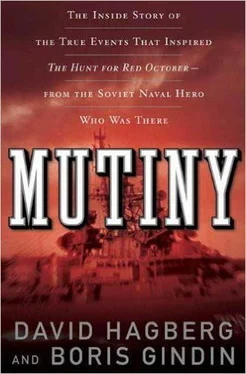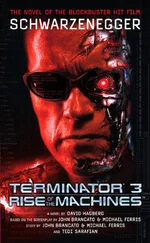Boris is combing his hair in the mirror and doesn’t even glance over at the cook. “I guess it must be very hard work. But I’m sorry; there’s nothing I can do about it.”
The cook knows better. It’s not that Gindin can’t do anything about the water problem—he’s the engineer after all—it’s that he won’t do anything about it.
After that Gindin never has a problem with the galley. If he has to work overtime and misses a meal, the cook personally delivers something good to eat to the senior lieutenant’s cabin, and in turn the galley is never without all the hot and cold running water it needs. Gindin doesn’t think he’s ever abused the system, but sitting now in the midshipmen’s dining hall he can’t be sure.
And yesterday, after the parade, when the entire ship was in a festive mood, Gindin made the rounds of all the machinery spaces to check everything, including the bilge pumps that ensured the Storozhevoy would not sink at his mooring if he were to take on water.
Gindin was in a mixed mood all that day, happy about the parade, proud to be a Soviet naval officer, sad about his father’s death, looking forward to his new job at Zhdanov, and impatient to get on with his life.
It’s possible, he thinks now, that he might have been impatient with his sailors, too. It was a holiday after all, yet he spent nearly two hours going over every single detail. Nothing missed his scrutiny, not a grease fitting that wasn’t cleaned properly, not an engine gauge reading that was off by one tiny decimal point, not a finger smudge in one of the logbooks. Everything had to be exactly correct.
Maybe at the end of a six-month rotation, when all they could think about was getting off the ship and going home to see their families, they felt he was being too tough on them. Maybe they resented his orders. Maybe Fomenko, who couldn’t get out of his bunk because his father was an alcoholic, was hatching some revenge plot.
Afterward Gindin went to lunch with some of the other officers. They talked, he remembers that much now, but he cannot seem to focus. He can’t get a grip in his head. For the life of him he cannot remember one single scrap of conversation at yesterday’s lunch. Not one word of it.
He does remember returning to his cabin to lie down, but Sergey Bogonets knocks on the door. He wants to talk because he’s lonely. They all are. It’s a holiday and they’re missing their families. Sergey talks about his wife and son. She flew down to Baltiysk, but they could only stay a couple of days before they had to fly home. Their leaving put Sergey into a depression and he just wanted a little human contact.
They went out on deck to smoke a cigarette. It was getting dark and cold by then. Only a few people were still out and about to admire the ships. Now that the lights were coming on throughout the town and aboard the fleet, the evening was getting pretty. Even festive.
Gindin does remember thinking that the people of Riga were at home now, behind the brightly lit windows with their families, getting set to celebrate the holiday: “We envied all those lucky strangers.”
He and Bogonets stayed on deck for a long time before they parted. Gindin went back down to the engine room, this time not to inspect but to talk to his sailors. They seemed to be in just as odd a mood as he was, lonely, missing their families, feeling a little strained.
So they start to talk about their lives before they were drafted into the navy. One of them is a big, tall guy from the suburbs near Dnepropetrovsk in south-central Ukraine. He came from a family of farmers and he and his four brothers had to help with the chores. They had chickens, rabbits, and pigs but no refrigerator. In the spring they would slaughter a pig, cut it into small chops and roasts, pack it in salt, and store it in the root cellar, where it would stay cool. One pig would provide enough meat to feed the entire family all winter. When they wanted to have pork for dinner, a cut would be brought from the root cellar the night before and soaked in freshwater to get rid of the salt.
“It was always salty, just the same,” the sailor lamented. But he would have exchanged the Storozhevoy for just one bite of his mother’s cooking, salty or not.
The Soviet Union has lied to Gindin as well as it has to Sablin. The only difference is Gindin knows that he personally can’t do a thing about it, while Sablin believes that he can do something to change the system. Not only that, he feels that it’s his sacred duty as a good Communist to do something.
It’s these similar but divergent views that create the problem.
In the academy and then aboard every ship and at every base Gindin has been assigned to he’s had to give political classes to the sailors who report to him. It’s nothing new. It’s a fact of life for every officer in the Soviet military. And like the vast majority of officers, Gindin does what he’s told, but he doesn’t have to like those orders, nor does he have to comply beyond the strict letter of the law. He’s given his lectures, every second Monday, and at this moment, sitting in the midshipmen’s dining hall, for the life of him he could not give even a simple report of any political lecture he’s ever given. Not even the one from last week in which Sablin had taken such an interest.
Gindin had jotted down his lecture notes from some Pravda article and had brought them up to Sablin’s cabin for the zampolit’s approval.
“This is exciting, Boris; don’t you think so?” Sablin had enthused. “We’ll be sailing to Riga to help celebrate the great revolution. What a perfect time this is.”
For another boring political lecture? Gindin has to wonder. But the zampolit is lighting up like a May 9th fireworks display to celebrate the end of WWII.
“Anyway, this stuff doesn’t matter,” Sablin says, glancing at Gindin’s notes. “The only truth is what we make.”
“Sir?”
“You’ll see,” Sablin says, almost slyly, but he’s smiling.
They are now facing each other in this completely insane situation, and the same look of holy zeal is in Sablin’s eyes.
Political officers are born, not made. In Sablin’s case he was brought up as a navy brat, on navy bases, knowing little or nothing of the world of civilians beyond the main gates. From the moment he could walk and talk a number of stern principles were drilled into him: Duty, discipline, and patriotism. The military way. Loyalty to the Soviet system. The pure ideals of the Communist man. Child of the revolution. Never lie. Despise hypocrisy. Hate injustice.
When he was only sixteen, Sablin applied to the Frunze Military Academy and was accepted. He was a model student and in his first year was elected to run the Kommunisticheksi Soyuz Molodioshi, Komsomol, the Communist youth organization on campus. He became the conscience of the class.
His classmates said they all believed in the ideals of Communism and Socialism. They were educated to believe. But Sablin not only believed with all his heart; he also wanted to put the ideals into action.
All the ideals.
That meant the democracy Lenin promised after the revolution. That meant all men were to be treated as equals. That meant everyone produced to the best of their abilities and everyone received what they needed. There was to be no poverty. No hunger. No homelessness. No injury or illness that wasn’t addressed. Universal work and education.
But Sablin was not a stupid young man. He looked around and he saw that the bureaucracy since Lenin was filled with hypocrisy and that everyone was supposed to close their eyes to it all.
Читать дальше












